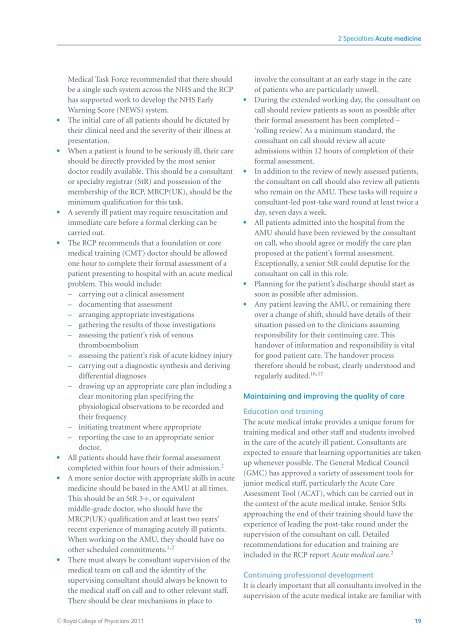Consultant physicians working with patients 5th edition - FSEM
Consultant physicians working with patients 5th edition - FSEM
Consultant physicians working with patients 5th edition - FSEM
Create successful ePaper yourself
Turn your PDF publications into a flip-book with our unique Google optimized e-Paper software.
Medical Task Force recommended that there should<br />
be a single such system across the NHS and the RCP<br />
has supported work to develop the NHS Early<br />
Warning Score (NEWS) system.<br />
� The initial care of all <strong>patients</strong> should be dictated by<br />
their clinical need and the severity of their illness at<br />
presentation.<br />
� When a patient is found to be seriously ill, their care<br />
should be directly provided by the most senior<br />
doctor readily available. This should be a consultant<br />
or specialty registrar (StR) and possession of the<br />
membership of the RCP, MRCP(UK), should be the<br />
minimum qualification for this task.<br />
� A severely ill patient may require resuscitation and<br />
immediate care before a formal clerking can be<br />
carried out.<br />
� The RCP recommends that a foundation or core<br />
medical training (CMT) doctor should be allowed<br />
one hour to complete their formal assessment of a<br />
patient presenting to hospital <strong>with</strong> an acute medical<br />
problem. This would include:<br />
– carrying out a clinical assessment<br />
– documenting that assessment<br />
– arranging appropriate investigations<br />
– gathering the results of those investigations<br />
– assessing the patient’s risk of venous<br />
thromboembolism<br />
– assessing the patient’s risk of acute kidney injury<br />
– carrying out a diagnostic synthesis and deriving<br />
differential diagnoses<br />
– drawing up an appropriate care plan including a<br />
clear monitoring plan specifying the<br />
physiological observations to be recorded and<br />
their frequency<br />
– initiating treatment where appropriate<br />
– reporting the case to an appropriate senior<br />
doctor.<br />
� All <strong>patients</strong> should have their formal assessment<br />
completed <strong>with</strong>in four hours of their admission. 2<br />
� Amoreseniordoctor<strong>with</strong>appropriateskillsinacute<br />
medicine should be based in the AMU at all times.<br />
This should be an StR 3+,orequivalent<br />
middle-grade doctor, who should have the<br />
MRCP(UK) qualification and at least two years’<br />
recent experience of managing acutely ill <strong>patients</strong>.<br />
When <strong>working</strong> on the AMU, they should have no<br />
other scheduled commitments. 1,2<br />
� There must always be consultant supervision of the<br />
medical team on call and the identity of the<br />
supervising consultant should always be known to<br />
the medical staff on call and to other relevant staff.<br />
There should be clear mechanisms in place to<br />
2 Specialties Acute medicine<br />
involve the consultant at an early stage in the care<br />
of <strong>patients</strong> who are particularly unwell.<br />
� During the extended <strong>working</strong> day, the consultant on<br />
call should review <strong>patients</strong> as soon as possible after<br />
their formal assessment has been completed –<br />
‘rolling review’. As a minimum standard, the<br />
consultant on call should review all acute<br />
admissions <strong>with</strong>in 12 hours of completion of their<br />
formal assessment.<br />
� In addition to the review of newly assessed <strong>patients</strong>,<br />
the consultant on call should also review all <strong>patients</strong><br />
who remain on the AMU. These tasks will require a<br />
consultant-led post-take ward round at least twice a<br />
day, seven days a week.<br />
� All <strong>patients</strong> admitted into the hospital from the<br />
AMU should have been reviewed by the consultant<br />
on call, who should agree or modify the care plan<br />
proposed at the patient’s formal assessment.<br />
Exceptionally, a senior StR could deputise for the<br />
consultant on call in this role.<br />
� Planning for the patient’s discharge should start as<br />
soon as possible after admission.<br />
� Any patient leaving the AMU, or remaining there<br />
over a change of shift, should have details of their<br />
situation passed on to the clinicians assuming<br />
responsibility for their continuing care. This<br />
handover of information and responsibility is vital<br />
for good patient care. The handover process<br />
therefore should be robust, clearly understood and<br />
regularly audited. 16,17<br />
Maintaining and improving the quality of care<br />
Education and training<br />
The acute medical intake provides a unique forum for<br />
training medical and other staff and students involved<br />
in the care of the acutely ill patient. <strong>Consultant</strong>s are<br />
expected to ensure that learning opportunities are taken<br />
up whenever possible. The General Medical Council<br />
(GMC) has approved a variety of assessment tools for<br />
junior medical staff, particularly the Acute Care<br />
Assessment Tool (ACAT), which can be carried out in<br />
the context of the acute medical intake. Senior StRs<br />
approaching the end of their training should have the<br />
experience of leading the post-take round under the<br />
supervision of the consultant on call. Detailed<br />
recommendations for education and training are<br />
included in the RCP report Acute medical care. 2<br />
Continuing professional development<br />
It is clearly important that all consultants involved in the<br />
supervision of the acute medical intake are familiar <strong>with</strong><br />
C○ Royal College of Physicians 2011 19

















